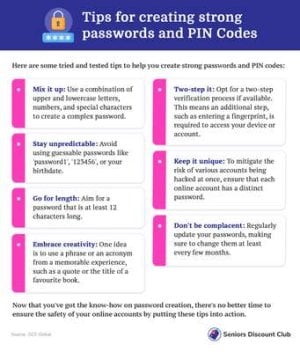Is your mobile data at risk? PM's surprising advice might not be enough to safeguard your phone!
In today's fast-paced digital world, the security of our personal information on mobile devices has taken centre stage.
As we embrace the convenience and capabilities of our mobile phones, which serve as lifelines for staying connected, managing finances, and even tracking our health, it becomes vital to prioritise protecting our sensitive data from cyber threats and hackers.
Amidst these concerns, our Prime Minister, Anthony Albanese, has shared a piece of advice aimed at helping Australians maintain their cybersecurity and stay safe in the digital realm.

He suggested turning off our mobile phones every night, for exactly five minutes, as a protective measure against cyber attacks. While some might view this as solid advice, is it enough to safeguard our precious data?
The Guardian newspaper quoted PM Albanese saying, 'We all have a responsibility. Simple things: turn your phone off every night for five minutes. For people watching this, do that every 24 hours, do it while you're brushing your teeth or whatever you're doing.'
Although it sounds like a simple and potentially helpful tip, it may not be sufficient to protect against modern malware and cyber threats.
The advice has some merit, as rebooting your phone can eliminate non-persistent malware that only exists in memory, offering a brief form of protection.
However, many advanced malware and spyware threats are persistent and can survive a power-off and reboot, leaving your data at continued risk.
So, what can you do to protect your mobile phone and sensitive data? Here are some tips beyond our PM's five-minute shutdown advice:

Here are some tried and tested tips to help you create strong passwords and PIN codes:
Source: GCF Global
 While the advice from the Australian Prime Minister may seem interesting, it's important to understand that protecting our mobile phones requires a more proactive and comprehensive approach in today's ever-changing cyber landscape.
While the advice from the Australian Prime Minister may seem interesting, it's important to understand that protecting our mobile phones requires a more proactive and comprehensive approach in today's ever-changing cyber landscape.
Simply put, we need to take additional steps to ensure the security of our sensitive data and defend against potential hackers. Remember, when it comes to cybersecurity, it's better to err on the side of caution!
Members, what are your thoughts and worries about online security risks in today's digital world? Share it with us by commenting in the comments section below.
As we embrace the convenience and capabilities of our mobile phones, which serve as lifelines for staying connected, managing finances, and even tracking our health, it becomes vital to prioritise protecting our sensitive data from cyber threats and hackers.
Amidst these concerns, our Prime Minister, Anthony Albanese, has shared a piece of advice aimed at helping Australians maintain their cybersecurity and stay safe in the digital realm.

Australian Prime Minister Anthony Albanese has advised people to turn off their mobile phones for five minutes daily as a cybersecurity measure. Image by jonasleupe from Unsplash
He suggested turning off our mobile phones every night, for exactly five minutes, as a protective measure against cyber attacks. While some might view this as solid advice, is it enough to safeguard our precious data?
The Guardian newspaper quoted PM Albanese saying, 'We all have a responsibility. Simple things: turn your phone off every night for five minutes. For people watching this, do that every 24 hours, do it while you're brushing your teeth or whatever you're doing.'
Although it sounds like a simple and potentially helpful tip, it may not be sufficient to protect against modern malware and cyber threats.
The advice has some merit, as rebooting your phone can eliminate non-persistent malware that only exists in memory, offering a brief form of protection.
However, many advanced malware and spyware threats are persistent and can survive a power-off and reboot, leaving your data at continued risk.
So, what can you do to protect your mobile phone and sensitive data? Here are some tips beyond our PM's five-minute shutdown advice:
- Get rid of the apps you don't need. Uninstall apps that are taking up unnecessary storage space, and delete any associated data. Many devices come pre-installed with apps that can't be uninstalled, known as 'bloatware', but these can be switched off to stop them from running automatically in the background.
- Log out of apps when you're done using them, even though it may seem bothersome to log in again with PIN codes and 2-Factor Authentication credentials. Leaving apps open without logging out puts your information at risk of being accessed by unauthorised individuals.
- Manage the privacy settings of each app and service you use. Privacy settings can be found in different places, such as your phone's operating system, within the app itself, or in an online portal.
- Learn how to clear your browser history frequently.
- Turn off as much as you can on the lock screen. Avoid showing personal notifications to minimise risk.
- Set the longest possible lock code and the shortest lock time you are comfortable with.
- Be aware of what you share. Ensure that you only give out what is necessary.
- Set a PIN code on your SIM card if you have one. While there's no guarantee that it will prevent all cyber threats, it's a good security measure to have in place.
Tips for creating strong passwords and PIN codes

Creating a strong password is of utmost importance in safeguarding your online accounts and protecting sensitive information from unauthorised access. Source: SDC
Here are some tried and tested tips to help you create strong passwords and PIN codes:
- Mix it up: Use a combination of upper and lowercase letters, numbers, and special characters to create a complex password.
- Stay unpredictable: Avoid using guessable passwords like 'password1', '123456', or your birthdate.
- Go for length: Aim for a password that is at least 12 characters long.
- Embrace creativity: One idea is to use a phrase or an acronym from a memorable experience, such as a quote or the title of a favourite book.
- Two-step it: Opt for a two-step verification process if available. This means an additional step, such as entering a fingerprint, is required to access your device or account.
- Keep it unique: To mitigate the risk of various accounts being hacked at once, ensure that each online account has a distinct password.
- Don't be complacent: Regularly update your passwords, making sure to change them at least every few months.
Source: GCF Global
Key Takeaways
- Australian Prime Minister Anthony Albanese suggests turning off mobile phones for five minutes every day for cybersecurity purposes.
- Regularly rebooting the phone can help stop non-persistent malware and spyware that may be running in the background.
- However, most malware nowadays is of the persistent threat type and can survive even a full power-off and reboot.
- Additional mobile cybersecurity tips include uninstalling unnecessary apps, logging out of apps when not in use, managing privacy settings, clearing browser history, and setting a SIM card PIN code.
Simply put, we need to take additional steps to ensure the security of our sensitive data and defend against potential hackers. Remember, when it comes to cybersecurity, it's better to err on the side of caution!
Members, what are your thoughts and worries about online security risks in today's digital world? Share it with us by commenting in the comments section below.








